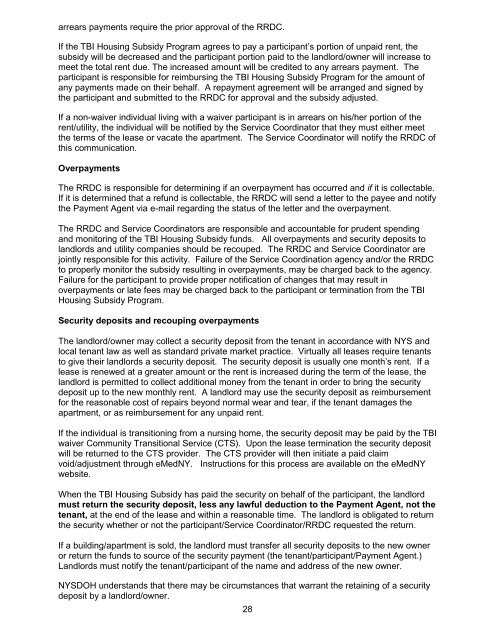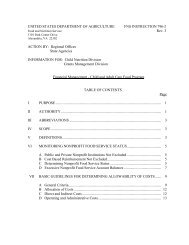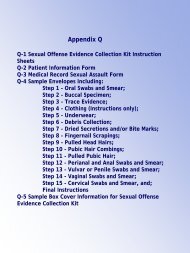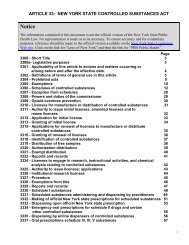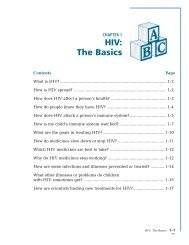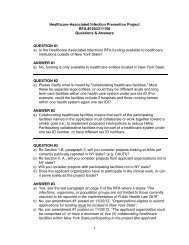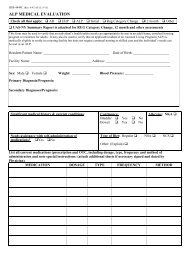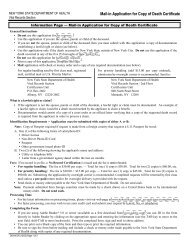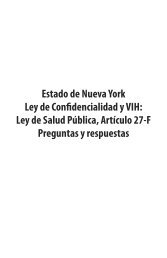TBI Housing Subsidy Program Manual, April 2013 - New York State ...
TBI Housing Subsidy Program Manual, April 2013 - New York State ...
TBI Housing Subsidy Program Manual, April 2013 - New York State ...
Create successful ePaper yourself
Turn your PDF publications into a flip-book with our unique Google optimized e-Paper software.
arrears payments require the prior approval of the RRDC.<br />
If the <strong>TBI</strong> <strong>Housing</strong> <strong>Subsidy</strong> <strong>Program</strong> agrees to pay a participant’s portion of unpaid rent, the<br />
subsidy will be decreased and the participant portion paid to the landlord/owner will increase to<br />
meet the total rent due. The increased amount will be credited to any arrears payment. The<br />
participant is responsible for reimbursing the <strong>TBI</strong> <strong>Housing</strong> <strong>Subsidy</strong> <strong>Program</strong> for the amount of<br />
any payments made on their behalf. A repayment agreement will be arranged and signed by<br />
the participant and submitted to the RRDC for approval and the subsidy adjusted.<br />
If a non-waiver individual living with a waiver participant is in arrears on his/her portion of the<br />
rent/utility, the individual will be notified by the Service Coordinator that they must either meet<br />
the terms of the lease or vacate the apartment. The Service Coordinator will notify the RRDC of<br />
this communication.<br />
Overpayments<br />
The RRDC is responsible for determining if an overpayment has occurred and if it is collectable.<br />
If it is determined that a refund is collectable, the RRDC will send a letter to the payee and notify<br />
the Payment Agent via e-mail regarding the status of the letter and the overpayment.<br />
The RRDC and Service Coordinators are responsible and accountable for prudent spending<br />
and monitoring of the <strong>TBI</strong> <strong>Housing</strong> <strong>Subsidy</strong> funds. All overpayments and security deposits to<br />
landlords and utility companies should be recouped. The RRDC and Service Coordinator are<br />
jointly responsible for this activity. Failure of the Service Coordination agency and/or the RRDC<br />
to properly monitor the subsidy resulting in overpayments, may be charged back to the agency.<br />
Failure for the participant to provide proper notification of changes that may result in<br />
overpayments or late fees may be charged back to the participant or termination from the <strong>TBI</strong><br />
<strong>Housing</strong> <strong>Subsidy</strong> <strong>Program</strong>.<br />
Security deposits and recouping overpayments<br />
The landlord/owner may collect a security deposit from the tenant in accordance with NYS and<br />
local tenant law as well as standard private market practice. Virtually all leases require tenants<br />
to give their landlords a security deposit. The security deposit is usually one month’s rent. If a<br />
lease is renewed at a greater amount or the rent is increased during the term of the lease, the<br />
landlord is permitted to collect additional money from the tenant in order to bring the security<br />
deposit up to the new monthly rent. A landlord may use the security deposit as reimbursement<br />
for the reasonable cost of repairs beyond normal wear and tear, if the tenant damages the<br />
apartment, or as reimbursement for any unpaid rent.<br />
If the individual is transitioning from a nursing home, the security deposit may be paid by the <strong>TBI</strong><br />
waiver Community Transitional Service (CTS). Upon the lease termination the security deposit<br />
will be returned to the CTS provider. The CTS provider will then initiate a paid claim<br />
void/adjustment through eMedNY. Instructions for this process are available on the eMedNY<br />
website.<br />
When the <strong>TBI</strong> <strong>Housing</strong> <strong>Subsidy</strong> has paid the security on behalf of the participant, the landlord<br />
must return the security deposit, less any lawful deduction to the Payment Agent, not the<br />
tenant, at the end of the lease and within a reasonable time. The landlord is obligated to return<br />
the security whether or not the participant/Service Coordinator/RRDC requested the return.<br />
If a building/apartment is sold, the landlord must transfer all security deposits to the new owner<br />
or return the funds to source of the security payment (the tenant/participant/Payment Agent.)<br />
Landlords must notify the tenant/participant of the name and address of the new owner.<br />
NYSDOH understands that there may be circumstances that warrant the retaining of a security<br />
deposit by a landlord/owner.<br />
28


